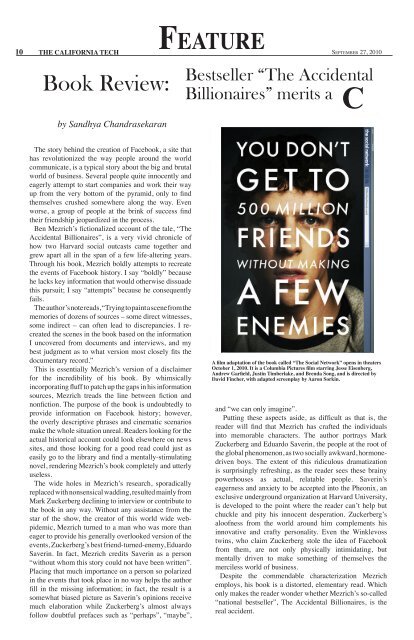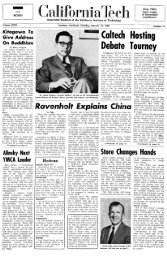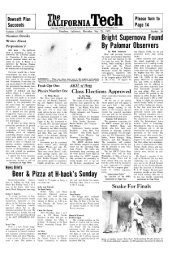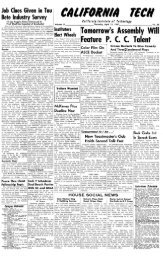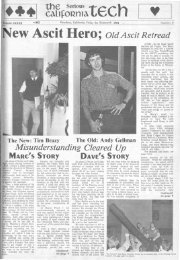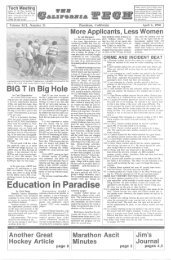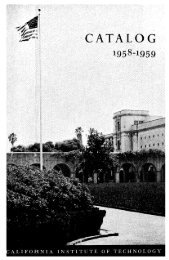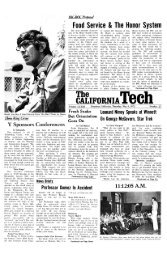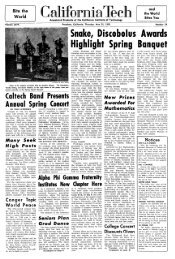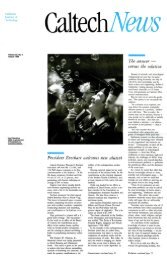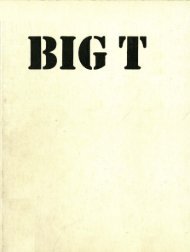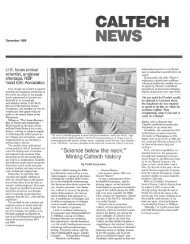PDF (v. 114:1, September 27, 2010) - CaltechCampusPubs
PDF (v. 114:1, September 27, 2010) - CaltechCampusPubs
PDF (v. 114:1, September 27, 2010) - CaltechCampusPubs
Create successful ePaper yourself
Turn your PDF publications into a flip-book with our unique Google optimized e-Paper software.
10<br />
Fe at u r e<br />
THE CAlIfOrnIA TECH se P t e m b e r <strong>27</strong>, <strong>2010</strong><br />
Book Review:<br />
by Sandhya Chandrasekaran<br />
The story behind the creation of Facebook, a site that<br />
has revolutionized the way people around the world<br />
communicate, is a typical story about the big and brutal<br />
world of business. Several people quite innocently and<br />
eagerly attempt to start companies and work their way<br />
up from the very bottom of the pyramid, only to find<br />
themselves crushed somewhere along the way. Even<br />
worse, a group of people at the brink of success find<br />
their friendship jeopardized in the process.<br />
Ben Mezrich’s fictionalized account of the tale, “The<br />
Accidental Billionaires”, is a very vivid chronicle of<br />
how two Harvard social outcasts came together and<br />
grew apart all in the span of a few life-altering years.<br />
Through his book, Mezrich boldly attempts to recreate<br />
the events of Facebook history. I say “boldly” because<br />
he lacks key information that would otherwise dissuade<br />
this pursuit; I say “attempts” because he consequently<br />
fails.<br />
The author’s note reads, “Trying to paint a scene from the<br />
memories of dozens of sources – some direct witnesses,<br />
some indirect – can often lead to discrepancies. I recreated<br />
the scenes in the book based on the information<br />
I uncovered from documents and interviews, and my<br />
best judgment as to what version most closely fits the<br />
documentary record.”<br />
This is essentially Mezrich’s version of a disclaimer<br />
for the incredibility of his book. By whimsically<br />
incorporating fluff to patch up the gaps in his information<br />
sources, Mezrich treads the line between fiction and<br />
nonfiction. The purpose of the book is undoubtedly to<br />
provide information on Facebook history; however,<br />
the overly descriptive phrases and cinematic scenarios<br />
make the whole situation unreal. Readers looking for the<br />
actual historical account could look elsewhere on news<br />
sites, and those looking for a good read could just as<br />
easily go to the library and find a mentally-stimulating<br />
novel, rendering Mezrich’s book completely and utterly<br />
useless.<br />
The wide holes in Mezrich’s research, sporadically<br />
replaced with nonsensical wadding, resulted mainly from<br />
Mark Zuckerberg declining to interview or contribute to<br />
the book in any way. Without any assistance from the<br />
star of the show, the creator of this world wide webpidemic,<br />
Mezrich turned to a man who was more than<br />
eager to provide his generally overlooked version of the<br />
events, Zuckerberg’s best friend-turned-enemy, Eduardo<br />
Saverin. In fact, Mezrich credits Saverin as a person<br />
“without whom this story could not have been written”.<br />
Placing that much importance on a person so polarized<br />
in the events that took place in no way helps the author<br />
fill in the missing information; in fact, the result is a<br />
somewhat biased picture as Saverin’s opinions receive<br />
much elaboration while Zuckerberg’s almost always<br />
follow doubtful prefaces such as “perhaps”, “maybe”,<br />
Bestseller “The Accidental<br />
Billionaires” merits a<br />
C<br />
A film adaptation of the book called “The Social Network” opens in theaters<br />
October 1, <strong>2010</strong>. It is a Columbia Pictures film starring Jesse Eisenberg,<br />
Andrew Garfield, Justin Timberlake, and Brenda Song, and is directed by<br />
David fincher, with adapted screenplay by Aaron Sorkin.<br />
and “we can only imagine”.<br />
Putting these aspects aside, as difficult as that is, the<br />
reader will find that Mezrich has crafted the individuals<br />
into memorable characters. The author portrays Mark<br />
Zuckerberg and Eduardo Saverin, the people at the root of<br />
the global phenomenon, as two socially awkward, hormonedriven<br />
boys. The extent of this ridiculous dramatization<br />
is surprisingly refreshing, as the reader sees these brainy<br />
powerhouses as actual, relatable people. Saverin’s<br />
eagerness and anxiety to be accepted into the Pheonix, an<br />
exclusive underground organization at Harvard University,<br />
is developed to the point where the reader can’t help but<br />
chuckle and pity his innocent desperation. Zuckerberg’s<br />
aloofness from the world around him complements his<br />
innovative and crafty personality. Even the Winklevoss<br />
twins, who claim Zuckerberg stole the idea of Facebook<br />
from them, are not only physically intimidating, but<br />
mentally driven to make something of themselves the<br />
merciless world of business.<br />
Despite the commendable characterization Mezrich<br />
employs, his book is a distorted, elementary read. Which<br />
only makes the reader wonder whether Mezrich’s so-called<br />
“national bestseller”, The Accidental Billionaires, is the<br />
real accident.


